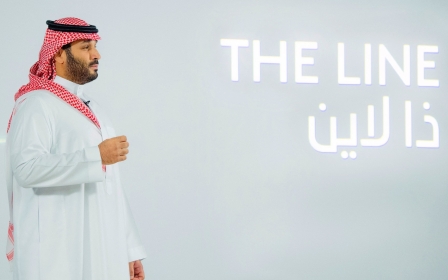Arabic press review: Jordanian withdraws from taekwondo championship to avoid facing Israeli

Jordanian taekwondo player withdraws from match due to Israeli participation
A Jordanian taekwondo player withdrew on Sunday from a semi-final match at the Cadet and Junior World Championships 2022, in Bulgaria, to avoid facing an Israeli player, Al-Quds Al-Arabi newspaper reported.
The star of the Jordanian women's junior taekwondo team, Maysir Al-Dahamsheh, withdrew from the competition before she was due to compete for a bronze medal against the Israeli.
Dahamsheh's withdrawal comes two months after the Jordanian national fencing player, Iyas Al-Zumar, withdrew from the world championship for juniors, in Dubai, after he was drawn to compete against an Israeli.
Although Jordan has been bound by a peace treaty with Israel since 1994, many Jordanian athletes have withdrawn from competing with Israelis in various sports competitions, to express their rejection of Israeli occupation of Palestine.
Stay informed with MEE's newsletters
Sign up to get the latest alerts, insights and analysis, starting with Turkey Unpacked
Saudi Arabia bans unlicensed social media ads
Saudi Arabia announced on Sunday the introduction of new regulations for social media advertisements, including a ban on ads that did not receive prior government approval, according to the Saudi Asharq Al-Awsat newspaper.
The General Commission for Audiovisual Media said the licence is mandatory for individuals wishing to launch social media ads, calling on those who wish to obtain it to apply through an online government platform and abide by the controls and conditions. It said the licence will cost 15,000 Saudi riyals ($4,000) and is valid for a period of three years.
The decision comes after reports that Saudi Arabian media authorities requested YouTube remove advertisements that it considered "offensive to Islamic values and principles".
A YouTube official told Saudi Arabian media last week that the platform has removed the ads, in response to the government’s request.
Organ trade gangs rife in Iraq
Organised gangs have taken advantage of the deteriorating economic conditions in Iraq to convince many to sell their organs for large sums of money, according to a report published by the Al-Araby Al-Jadeed online newspaper.
The paper cited a report published by the Iraqi Supreme Judicial Council on 26 July, which revealed that a gang led by a woman had carried out about 250 organ trade operations in the past five years, through social media platforms in the country.
The report quoted confessions by the mastermind of these operations, and the detainees, that "the gang was formed in 2017, and included five people who created pages on social media platforms, and carried out missions through these pages to lure people to donate their organs in exchange for large sums of money, and then to sell them".
Interior Ministry spokesperson Major General Khaled al-Muhanna told Al-Araby Al-Jadeed that the ministry has arrested members of gangs specialised in selling human organs in Iraq, after revealing the fraudulent methods and tricks they use to lure their victims.
Muhanna pointed out that the majority of human organ trade gangs are active in areas where the population lives below the poverty line and conditions have deteriorated significantly.
He explained that the methods used by these gangs include promising large sums of money, and forging personal documents to deceive hospitals into performing surgery in the belief that the donor is the relative of a patient, as Iraqi law allows the donation of organs by a patient's relatives.
One of the victims, a 31-year-old, told Al-Araby Al-Jadeed that a broker who negotiated with a gang to sell human organs convinced him to sell his kidney for $40,000.
"I never planned to sell my kidney for an amount that I thought will change my life for the better; however, eventually the money ran out and I lost my health," he said.
Saudi Arabia to deport thousands of expatriates
The Saudi Ministry of Interior said that the total number of expatriates who are currently subject to procedures relating to residency violations has reached 57,102, according to the New Khalij website.
The ministry stated that 45,409 violators were referred to their diplomatic missions to obtain travel documents, 3,399 were asked to complete their travel reservations, while 11,595 people are in the process of deportation.
The ministry said that within the period 21-27 July, 12,632 people breaching residency, work and border security regulations were arrested. It said that 233 people were arrested while trying to cross the border into Saudi Arabia, 40 percent of whom were Yemenis, 49 percent Ethiopians, and 11 percent from other nationalities.
*Arabic press review is a digest of news reports not independently verified as accurate by Middle East Eye.
Middle East Eye delivers independent and unrivalled coverage and analysis of the Middle East, North Africa and beyond. To learn more about republishing this content and the associated fees, please fill out this form. More about MEE can be found here.




